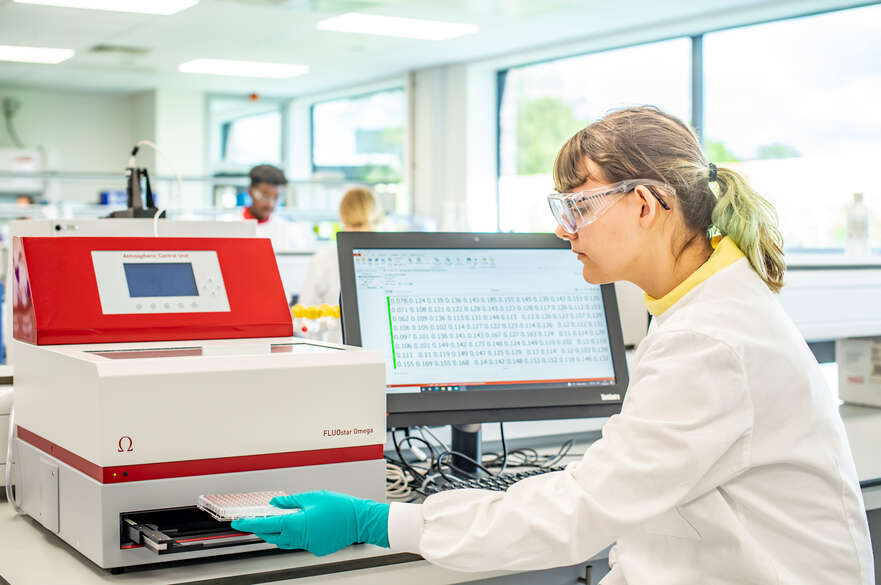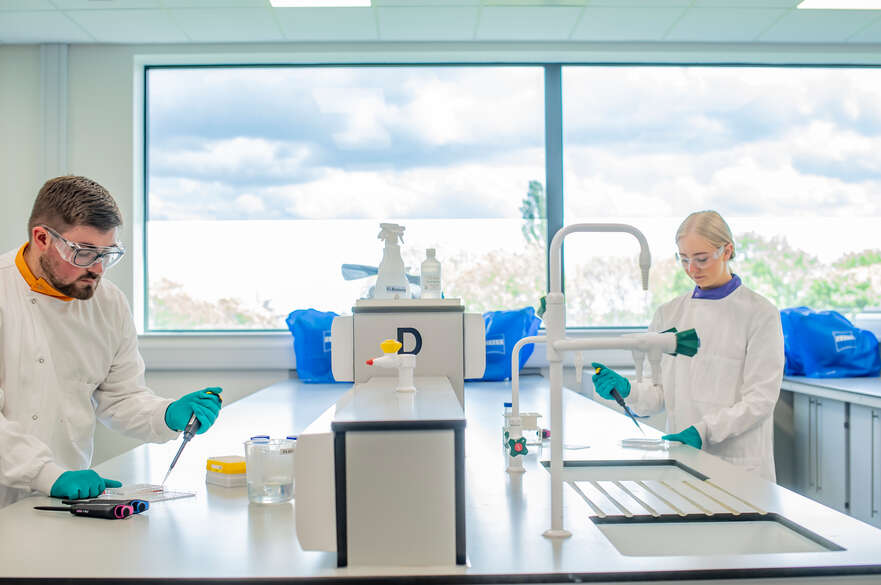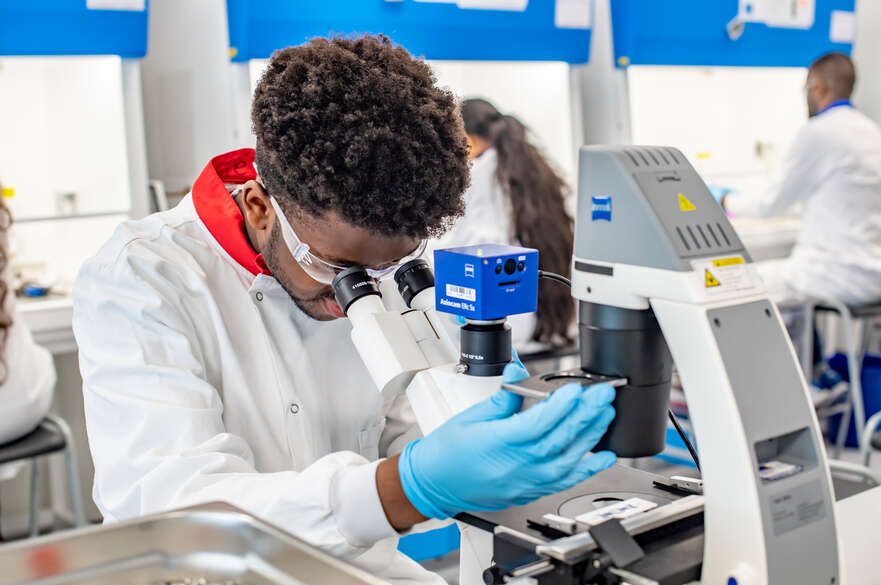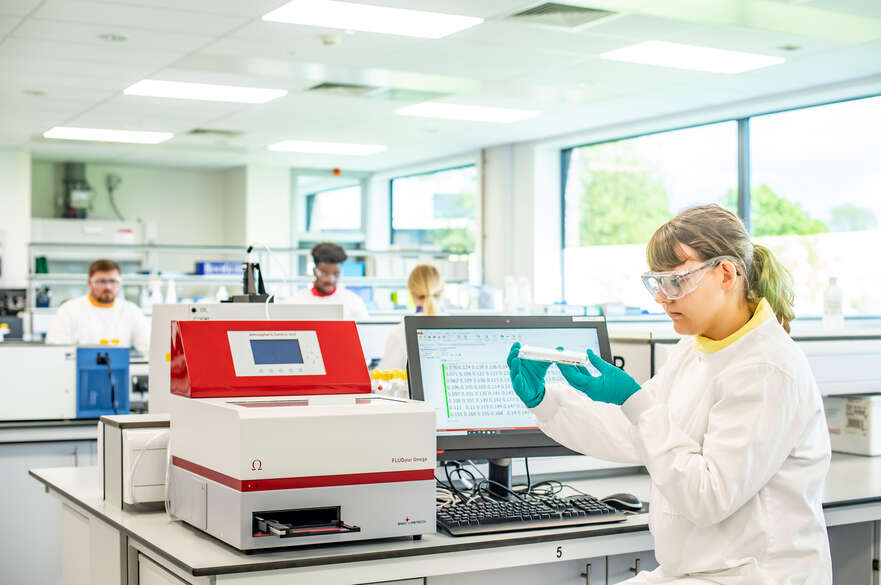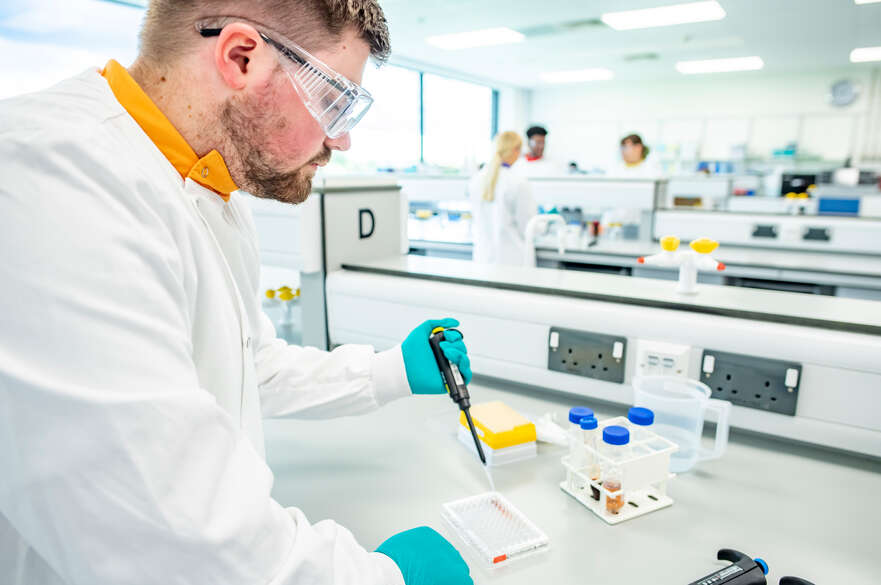This course is in Clearing
Offers from 80 tariff points
About this course
Biomedical science is the application of science to health. It is focused on studying the human body in health and disease, including the diagnosis and treatment of infectious diseases and complex health problems such as cancer, diabetes and heart disease. At NTU we focus on teaching you the practical skills you’ll need to be successful in this field.
If your mission is to save lives, then you’ll get all the practical experience you need on our course. You’ll get to use our industry-standard equipment right from the very start of your course, such as our Haematology and clinical chemistry analysers, as used in NHS testing laboratories. This means you’ll stand out from the crowd when applying for placements and positions after graduation. You’ll be familiar with how a professional lab works and already know how to follow laboratory processes and protocols used in the workplace.
When you are working in our lab facilities, you are becoming familiar with the same equipment you’ll find in an NHS, research or industrial lab – giving you a head start when you graduate.
Why study BSc (Hons) Biomedical Science at NTU?
Community and support
With support from your lecturers, personal tutors and technical staff, you can be sure we'll be here for you during your studies. Alongside your lectures and lab classes, you’ll also have tutorial sessions. These are a chance to regularly meet in small groups with your personal tutor and members of your course to discuss the topics you are studying.
Got any feedback on your course? You’ll have lots of opportunities to discuss your course, for example in your tutorial sessions, with your course leader and course reps and you even have the chance to feedback on every module you study with an end of module survey. We love to hear your feedback and how we can make improvements. Following your feedback, we have recently added Professional Skills modules which are specific to the area of biosciences you are studying. We’ve also increased our support for your coursework assignments too, through drop-in sessions accessible when you need them most.
There’s support from your peers too. Our mentoring schemes give you support from other students on your course. Whether you need help with your studies or university life in general, they’ve been there and can give you a students’ perspective. Find out more about the support you’ll receive at NTU.
Get involved in our research
Our research is tackling real-world issues – and you can get involved. Our John van Geest Cancer Research Centre is saving lives by improving the diagnosis and treatment of cancer. In your final year, you can collaborate with this research centre and be at the forefront of new discoveries.
Work-like experiences
As well as using industry-standard equipment, you’ll also be learning in a way that encourages problem-solving and develops practical skills that you’ll be using when you graduate. By working on clinical diagnosis scenarios and with our life-like 3D-printed human body and organ models (developed here at NTU) we are teaching you to think and work like a biomedical scientist.
Take a work placement
Placements tell future employers you know how to do it as well as why. Our industry connections as well as the support you'll get from our Employability team all add up to a valuable work placement experience.
You'll be supported throughout your placement year and will write a reflective report and diary during your placement. When you successfully complete your placement, you will be eligible to receive an additional award of a Diploma in Professional Practice.
Meet our staff
Whether your interest is working in the NHS, research or in the industry we have experienced staff from a wide range of backgrounds. In fact, some of them are also working within the NHS so they’ll be teaching you the latest thinking in the biomedical science field. Their contacts help you find great placement opportunities too.
Not only that, but our staff are prize winners too! Our Biomedical Science team won the Vice Chancellor’s Outstanding Practice Team award – recognising their commitment to outstanding teaching and practice.
Industry focused
We don’t work in isolation from employers. Our strong working relationship with the NHS and local employers benefits you in lots of ways.
- We meet regularly with employers within the NHS and the wider biomedical industry to keep our courses current - this means you are learning with the most up-to-date teaching materials and practical skills.
- We have staff who are currently working or have previously worked in the NHS and related areas. These links give you access to the latest industry knowledge and projects that mirror workplace-like experiences in the NHS. This all adds up to give you an insight into where you could be working after graduation.
Develop your portfolio
While you are at NTU you’ll compile a Skills Portfolio. This is where you’ll keep evidence of all the techniques and skills you’ve mastered. These portfolios help you to document and develop your skills while you are with us, honing the skillset of a graduate Biomedical Scientist. They are a valuable tool when you graduate too, as they can be used to show future employers you are ready to work in a professional environment.
What you’ll study
During your time at NTU, you’ll be studying the key aspects of the disease, disease prevention and complex health issues such as cancer, diabetes and heart disease. The course covers all the major areas of biomedical science including cellular pathology, clinical biochemistry and immunology. You’ll be able to recognise common illnesses and disorders through their key symptoms, use state-of-the-art diagnostic techniques such as histopathology, blood counts and clinical biochemical analysis to confirm the diagnosis, and even suggest suitable treatments.
You’ll also gain an understanding of the underlying principles of biochemistry, molecular biology and physiology which will lay the foundations for your biomedical science knowledge.
Study abroad opportunities
Get ready to embark on an adventure with our study abroad programs at partner universities or by getting a work placement overseas. Both opportunities will boost your employability, build lifelong friendships, and allow you to experience the world in a whole new way.
Introduction to Biochemistry
Study the key aspects of macromolecules, cell structure and function, and inter-relationships in both practical and theoretical contexts.
Practical Techniques for Biology
Considers the principles of experimental design, data collection and analysis, including techniques in centrifugation, chromatography, electrophoresis, microscopy and radiobiology.
Genetics and Immunology
Develops genetic concepts and introduces basic aspects of the immune system, including the molecules, cells and interactions involved.
Introduction to Microbiology
Study various groups of microbes, their function and roles, and consider the importance of the microbial world, the biology of micro-organisms, and medical, environmental and industrial microbiology.
Living Systems
Introduces levels of biological organisation from molecules to cells and ecosystems, providing a platform for knowledge and skills
upon which other modules are developed.
Introduction to Physiology
Introduces the physiology of human organ systems (respiratory, nervous, cardiovascular, urinary, endocrine and muscular) and examines the process of homeostasis.
Biomedical Science in Practice
Learn about key disciplines and current research topics in biomedical science as well as aspects of professional practice which
form an important part of your preparation for employment.
Metabolism and its Control
Explore the central pathways of oxidative catabolism and anabolism of carbohydrates and fats in eukaryotic cells, and cover the biochemical basis of cellular signal transduction.
Biomolecular Structure and Function
Learn about the functions of polymerases, binding proteins, helicases, ligases, topoisomerases and chromosomes in DNA replication as well as RNA polymerases.
Immunopharmacology
Considers disordered cellular and tissue physiology resulting from disease and drugs that can treat those diseases. You’ll develop an understanding of health and common illnesses.
Clinical Biochemistry
Study a variety of disorders and learn about their clinical symptoms, biochemical and molecular defects, detection, diagnosis and treatment.
Clinical and Public Health Microbiology
Learn the principles and applications of diagnostic and analytical microbiology in the monitoring and control of diseases caused by microbes.
Optional year-long work placement. If you are not taking a placement, you will progress directly to your final year in year three.
Research Project
Learn practical research techniques, including a review of scientific writing and critical appraisals of published work, as well as oral presentations and plagiarism.
Immunology and Virology
Explore the molecular and cellular mechanisms of innate and adaptive immunology, analyse immune responses to infectious agents and cancer, and review the principles of vaccination.
Haematology and Transfusion Practice
Study the biological basis of diseases of the blood and blood-forming organs and the principles of the techniques used in their investigation.
Cellular Pathology
You’ll explore the key topics in cellular pathology, with particular relevance to current medical and diagnostic practice. Apply your specialist knowledge to critically analyse data and information. This will include an appreciation of the laboratory's role in the diagnosis and treatment of illnesses, alongside the fundamental issues associated with modern laboratories.
Infectious Diseases and their Control
Covers the significance of infectious diseases in human medicine and looks at mechanisms of control of pathogenic microbes and how they can be used in prevention and treatment.
We regularly review and update our course content based on student and employer feedback, ensuring that all of our courses remain current and relevant. This may result in changes to module content or module availability in future years.
Don’t just take our word for it, hear from our students themselves
Video Gallery
How you're taught
You will typically study six modules in Year One and Two. Each module involves substantial amounts of practical work, in addition to lectures. In your final year, you’ll study five modules and a research project.
Hands-on learning
You’ll learn through a mix of:
- lectures - covering the key theories
- seminars - smaller-group sessions perfect for learning key skills and collaborative working
- practical sessions - using our extensive range of industry-standard facilities
- workshops - this includes surgery sessions where you’ll meet with your lecturer in small groups to discuss any problems or work through challenging topics.
The rest of your time will be spent carrying out independent study such as reading textbooks and lecture notes, and working on exercises.
A placement year may be taken between year 2 and year 3 of study.
The course is very practical and you’ll be spending lots of time in our industry-standard laboratories. This is because we believe the amount of time you spend getting hands-on experience in a laboratory is very important to prepare you for the world of work.
You’ll get to use our industry-standard equipment right from the very start of your course including haematology and clinical chemistry analysers, as used in NHS testing laboratories. You’ll get to know how a professional lab works and how to follow laboratory processes and protocols used in industry – all valuable skills to have before you graduate.
We have a focus on using digital skills to support you in your practice sessions. For example, you might do an online simulation of the experiment you are going to perform in the lab. This will get you familiar with the techniques and protocols so you can be confident and really make the most of your time in our labs.
Research informed teaching
Our research is tackling real-world issues – and the people working on this research will be teaching you. It also informs the subjects you’ll be studying with us so you can be sure your knowledge will be cutting-edge in your field. In the last Research Excellence Framework (REF 2021) - the UK's system for assessing the quality and impact of research in universities - we’re proud that 99% of NTU’s Allied Health Professions, Dentistry, Nursing and Pharmacy submission was assessed to be world-leading or internationally excellent.
Learn a new language
Alongside your study you also have the opportunity to learn a new language. The University Language Programme (ULP) is available to all students and gives you the option of learning a totally new language or improving the skills you already have. Find out more about the ULP.
How you're assessed
People excel in different ways, and we want everybody to have the best possible chance of success. That’s why we’ve adopted a range of assessment types, including:
- coursework, including group projects, case studies, dissertation and other assignments
- practical assessments, such as individual and group presentations, laboratory assessments and lab reports
- exams and tests, including formal exams, written tests and multiple-choice.
Careers and employability
Excellent placement opportunities
A placement is one of the best ways to prepare for your future career. Whether you choose a year-long placement or a shorter summer option, you’ll gain hands-on experience, apply your knowledge in a real-world setting, and develop the skills employers are looking for.
You can take a year-long sandwich placement with support from our expert Employability team. You’ll be guided throughout the process and complete a reflective report and diary. Successfully completing your placement earns you a Diploma in Professional Practice—a great addition to your CV. Students who take placements are twice as likely to secure a graduate job within six months.
If your placement is in an IBMS-approved laboratory you’ll be able to complete your training portfolio as part of your registration with the Health Care Professions Council (HCPC).
Our biomedical science students have completed placements with leading organisations including the NHS, Public Health England, Sanofi-Aventis and InterHealth Canada Ltd, in roles such as:
- Trainee Biomedical Scientists
- Quality Intern
- Laboratory Technologiest Intern
- Regulatory Officers
Short summer placements are also available—a flexible way to explore different career paths, gain experience, and build your professional network. Recently students on this course have taken summer placements at NTU in our Department of Biosciences, and the University of Nottingham working on research projects.
Find out more about work placements.
Your career development
Our recent graduates have secured roles at companies including:
- NHS
- Nottingham Emergency Medical Services
- Nuffield Health
- GlaxoSmithKline
They have gone into a wide variety of job roles including:
- Registered Biomedical Scientist
- Health Advisor
- Secondary Science Teacher
- Stop Smoking Adviser
- Bowel Cancer Screening Officer
- Information Analyst
Many also choose to undertake further study on one of our Masters-level courses or MPhil and PhD research degrees.
NTU Enterprise
You'll also have the opportunity to turn your ideas into a viable business with help from NTU Enterprise, NTU's purpose-built Centre for Entrepreneurship and Enterprise, a support centre to help students create, develop and grow their own businesses.
Campus and facilities
You’ll mainly be studying in the Interdisciplinary Science and Technology Centre (ISTeC) and Rosalind Franklin Buildings with access to facilities including our extensive SuperLab, with space for almost 200 students.
Our self-contained, community-focused Clifton Campus has been designed to keep students busy between lectures. Catch-up with your coursemates in the Pavilion’s barista café and Refectory; brainstorm group presentations in chic and stylish study spaces; enjoy some proper R&R in The Point, home of our Students’ Union. The campus also hosts the multimillion-pound Clifton Sports Hub, offering great options for everyone — whatever your interests, and however competitive you’d like to get!
You’re also right next to the bright lights of Nottingham — one of Britain’s top 10 student cities, and one of Europe’s top 25. All through termtime, a dedicated on-campus bus service will get you to the heart of the action (and back) in under 25 minutes. You’ll find a city stuffed with history, culture, and well-kept secrets to discover at your leisure: enjoy lush green spaces, galleries, hidden cinemas and vintage shopping by day, and an acclaimed food, drink and social scene by night.
Entry requirements
This course is in Clearing
Looking for a place in Clearing? We are accepting application and would love to hear from you!
UK students
This course is in Clearing
Looking for a place in Clearing? We are accepting applications and would love to hear from you!
Clearing requirements
From 80 UCAS tariff points from up to 4 qualifications.
To discuss our entry requirements and see what we can offer you, call us now on +44 (0)115 848 6000. Alternatively, if you already have your qualifications, apply online via our Clearing Application form.
Preparing for results day? Beat the queue and sign up for NTU Priority for up-to-date information about all things Clearing. You’ll get an offer ahead of Clearing, subject to you achieving the required grades on results day.
- 80 UCAS Tariff points from up to four qualifications (two of which must be A-level equivalent including Biology grade D).
To find out what qualifications have tariff points, please use our tariff calculator.
Additional requirements for UK students
There are no additional requirements for this course.
Contextual offers
If you don’t quite meet our entry requirements, we might be able to make you a lower offer based on a range of factors, including your background (such as where you live and the school or college you attended), your experiences and your individual circumstances (you may have been in care, for example). This is called a contextual offer, and we get data from UCAS to help make these decisions. We do this because we believe everyone with the potential to succeed at NTU should have the opportunity to do so, no matter what barriers you may face.
Meeting our entry requirements
Hundreds of qualifications in the UK have UCAS Tariff points attached to specific grades, including A-levels, BTECs, T Levels and many more. You can use your grades and points from up to four different qualifications to meet our criteria. Enter your predicted or achieved grades into our Tariff calculator to find out how many points your qualifications are worth.
Other qualifications and experience
NTU welcomes applications from students with non-standard qualifications and learning backgrounds, either for year one entry or for advanced standing beyond the start of a course into year 2 or beyond.
We consider study and/or credit achieved from a similar course at another institution (otherwise known as credit transfer), vocational and professional qualifications, and broader work or life experience.
Our Recognition of Prior Learning and Credit Transfer Policy outlines the process and options available for this route. If you wish to apply via Recognition of Prior Learning, please contact the central Admissions and Enquiries Team who will be able to support you through the process.
Getting in touch
If you need more help or information, get in touch through our enquiry form.
International students
This course is in Clearing
Looking for a place in Clearing? We are accepting applications and would love to hear from you!
Clearing requirements
From 80 UCAS tariff points from up to 4 qualifications.
To discuss our entry requirements and see what we can offer you, call us now on +44 (0)115 848 6000. Alternatively, if you already have your qualifications, apply online via our Clearing Application form.
Preparing for results day? Beat the queue and sign up for NTU Priority for up-to-date information about all things Clearing. You’ll get an offer ahead of Clearing, subject to you achieving the required grades on results day.
- Academic entry requirements: 80 UCAS Tariff points from up to four qualifications (two of which must be A-level equivalent including Biology grade D). We accept equivalent qualifications from all over the world. Please check your international entry requirements by country.
- English language requirements: See our English language requirements page for requirements for your subject and information on alternative tests and Pre-sessional English.
Additional requirements for international students
If you need help achieving the academic entry requirements, we offer a Foundation preparation course for this degree. The course is offered through our partner Nottingham Trent International College (NTIC) based on our City Campus.
English language requirements
View our English language requirements for all courses, including alternative English language tests and country qualifications accepted by the University.
If you need help achieving the language requirements, we offer a Pre-Sessional English for Academic Purposes course on our City campus which is an intensive preparation course for academic study at NTU.
Other qualifications and experience
If you have the right level of qualifications, you may be able to start your Bachelors degree at NTU in year 2 or year 3. This is called ‘advanced standing’ entry and is decided on a case-by case basis after our assessment of your qualifications and experience.
You can view our Recognition of Prior Learning and Credit Transfer Policy which outlines the process and options available, such as recognising experiential learning and credit transfer.
Sign up for emails
Sign up to receive regular emails from the International Office. You'll hear about our news, scholarships and any upcoming events in your country with our expert regional teams.
Getting in touch
If you need advice about studying at NTU as an international student or how to apply, our international webpages are a great place to start. If you have any questions about your study options, your international qualifications, experience, grades or other results, please get in touch through our enquiry form. Our international teams are highly experienced in answering queries from students all over the world.
Policies
We strive to make our admissions procedures as fair and clear as possible. To find out more about how we make offers, visit our admissions policies page.



